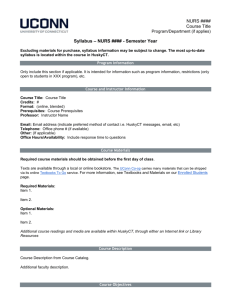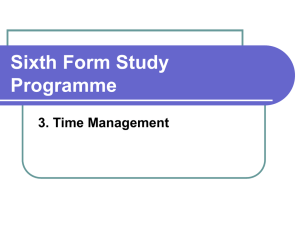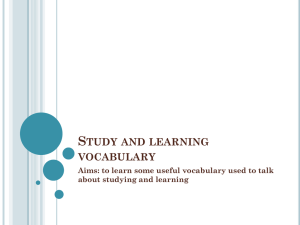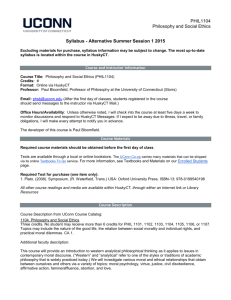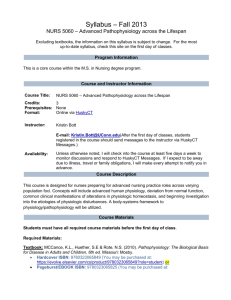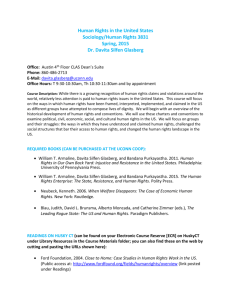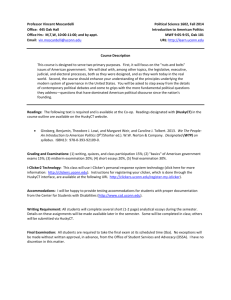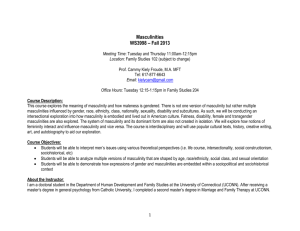Syllabus – Summer Session I – Online - 2015
advertisement
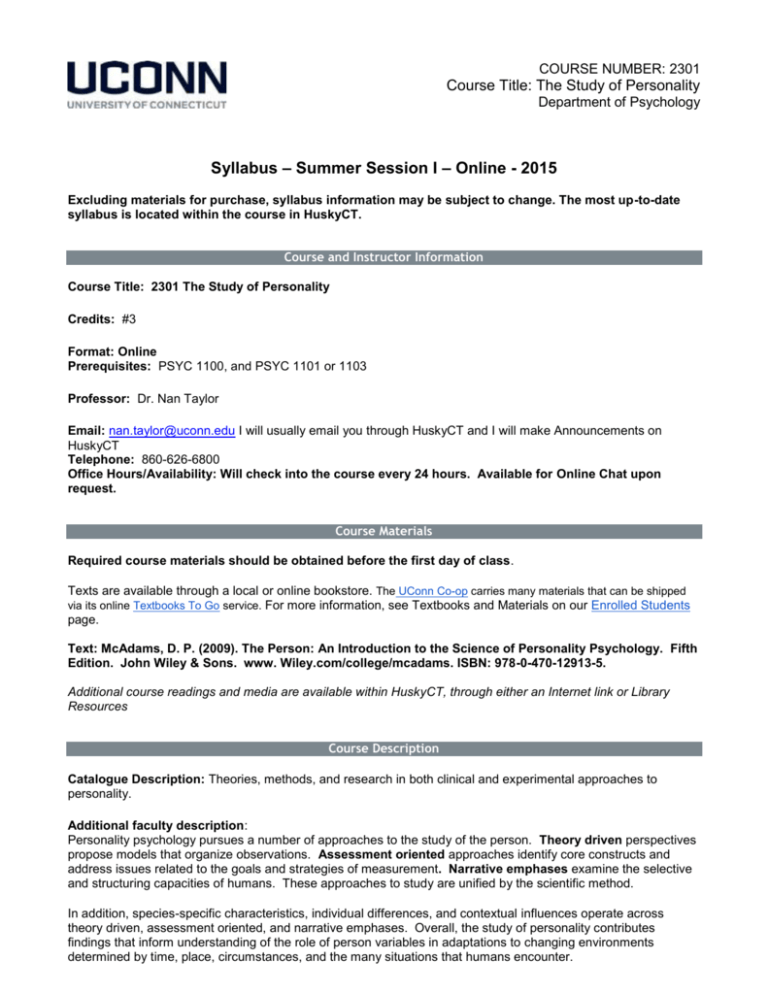
COURSE NUMBER: 2301 Course Title: The Study of Personality Department of Psychology Syllabus – Summer Session I – Online - 2015 Excluding materials for purchase, syllabus information may be subject to change. The most up-to-date syllabus is located within the course in HuskyCT. Course and Instructor Information Course Title: 2301 The Study of Personality Credits: #3 Format: Online Prerequisites: PSYC 1100, and PSYC 1101 or 1103 Professor: Dr. Nan Taylor Email: nan.taylor@uconn.edu I will usually email you through HuskyCT and I will make Announcements on HuskyCT Telephone: 860-626-6800 Office Hours/Availability: Will check into the course every 24 hours. Available for Online Chat upon request. Course Materials Required course materials should be obtained before the first day of class. Texts are available through a local or online bookstore. The UConn Co-op carries many materials that can be shipped via its online Textbooks To Go service. For more information, see Textbooks and Materials on our Enrolled Students page. Text: McAdams, D. P. (2009). The Person: An Introduction to the Science of Personality Psychology. Fifth Edition. John Wiley & Sons. www. Wiley.com/college/mcadams. ISBN: 978-0-470-12913-5. Additional course readings and media are available within HuskyCT, through either an Internet link or Library Resources Course Description Catalogue Description: Theories, methods, and research in both clinical and experimental approaches to personality. Additional faculty description: Personality psychology pursues a number of approaches to the study of the person. Theory driven perspectives propose models that organize observations. Assessment oriented approaches identify core constructs and address issues related to the goals and strategies of measurement. Narrative emphases examine the selective and structuring capacities of humans. These approaches to study are unified by the scientific method. In addition, species-specific characteristics, individual differences, and contextual influences operate across theory driven, assessment oriented, and narrative emphases. Overall, the study of personality contributes findings that inform understanding of the role of person variables in adaptations to changing environments determined by time, place, circumstances, and the many situations that humans encounter. Course Objectives By the end of the semester, students should be able to: Demonstrate mastery of the knowledge base by studying the major theoretical orientations and the research findings generated within different approaches. Assessment procedures related to different theories should be recognized. Differences between paradigmatic and narrative modes are critical distinctions that will be made throughout the course. Apply the material to the goals of physical and psychological health and discuss findings related to the applied uses of theories of personality. Critically evaluate the assessment procedures in the field of personality in terms of reliability, validity, appropriate uses, inferences and populations. Discuss and differentiate the paradigmatic and narrative models of analysis. Understand the critical issues involved in each perspective. Course Outline (and Calendar if Applicable) Module One – Week One June 01 – June 06 Module Two – Week Two June 07 – June 13 Module Three – Week Three June 14 – June 20 Module Four – Week Four June 21 – June 27 Module Five – Week Five June 28 – July 02 Chapter One: Studying the Person. Chapter Two: Evolution and Human Nature. Lab: Therapeutic Writing Discussion Board: Expressive Writing to Heal/James Pennebaker. Blog: Martin Seligman and Flourishing. Exam #1. Chapter Three: Social Learning and Culture. Chapter Four: Personality Traits. Lab: Locus of Control and Self-Efficacy. Discussion Board: None. Blog: None. Exam #2. Chapter Five: 5 Basic Traits. Chapter Six: Continuity and Change in Traits. Lab: Assessment Conscientiousness and Mindfulness. Discussion Board: The Longevity Project/Friedman. Blog: Will-Power: Decision and Fatique/Baumeister. Exam #3. Chapter Seven: Motives and Goals. Chapter Eight: Self and Others. Chapter Nine: Developmental Stages and Tasks. Lab: Assessment Assessment of Gratitude and Generosity as measures of Human Strengths. Discussion Board: Neural Underpinnings of Generosity/Gilrath Blog: Overcoming Trauma/Alpert. No Exam. Chapter Ten: Life Scripts and Life Stories. Chapter Eleven: Interpretation of Stories. Chapter Twelve: Writing Stories of Lives. Lab: The Storytelling Brain/Gazzaniga; Brain, Consciousness, & Autobiographical Memory/Damasio. Discussion Board: Experienced and remembered self/Kahneman. Blog: Evolution and function of Storytelling/Bloom Final Exam. Course Requirements and Grading Assessment and Grading: 1. Discussion Board Responses, Blog Responses and the Labs can earn a total of 100 points and contribute 50% to your final grade when you participate as directed. Directions are specified where each assignment is posted within the Modules. 2. There are 4 Online Exams and the exams are mandatory. The exams are open book and open notes but you must do your own work by yourself. To work with another person is a violation of academic integrity. You can make one attempt on each of the exams. Do not look the answers up on the web unless you are using electronic versions of the textbook. Alternative web sources might not be reliable or the answer you find may not be related to the question that is on the exam. Be careful! There are 35 multiple-choice questions on each of the first three exams. The first four exams are not cumulative. The Final Exam has 50 multiple-choice questions and half of the questions are cumulative. You may drop your lowest exam grade from among the first three exams. However, the grade on the Final Exam cannot be dropped. The average score of three highest scores on the first 3 exams and the score on the final exam contributes 50% to your final grade in the course. The online descriptions of the exams provide additional details. You can also do a practice test before each of the exams. You can have multiple attempts on the practice tests. You have only one attempt of the actual exam. The format for exams is multiple choice. You should expect to hand the material in by the end of the week when it is assigned. You can also move ahead in the Modules. There are no late dates that carry penalties. However, you should expect to keep up week by week. And, you should have half of the work completed by midterm. Practice exams will be open throughout the course. The graded exams will open on Wednesday of each week that they are assigned and close when the new exam opens the following week (also, Wednesday). Course Components Weight Component A – Exams 50% Component B – Discussion Boards, Labs, and Blogs 50% Grading Scale: Undergrad Grade Letter Grade GPA 93-100 A 4.0 90-92 A- 3.7 Grade Letter Grade GPA 87-89 B+ 3.3 83-86 B 3.0 80-82 B- 2.7 77-79 C+ 2.3 73-76 C 2.0 70-72 C- 1.7 67-69 D+ 1.3 63-66 D 1.0 60-62 D- 0.7 <60 F 0.0 Due Dates and Late Policy Deadlines are based on Eastern Standard Time; if you are in a different time zone, please adjust your submittal times accordingly. The instructor reserves the right to change dates accordingly as the semester progresses. All changes will be communicated in an appropriate manner. You may complete the work out of sequence. For example, some people address the Knowledge Base work in the exams first. Others choose to do the discussion boards or labs first. You can also complete the work during the week it is assigned. You are free to make your own schedule. However, for the sake of evaluation you should complete all of Modules One and Two by July 26 and all of the Modules should be done by August 08. Feedback and Grades I will make every effort to provide feedback and grades in 48 course, refer to My Grades in HuskyCT. hours. To keep track of your performance in the Student Responsibilities and Resources As a member of the University of Connecticut student community, you are held to certain standards and academic policies. In addition, there are numerous resources available to help you succeed in your academic work. This section provides a brief overview to important standards, policies and resources. Student Code You are responsible for acting in accordance with the University of Connecticut's Student Code Review and become familiar with these expectations. In particular, make sure you have read the section that applies to you on Academic Integrity: ● ● Academic Integrity in Undergraduate Education and Research Academic Integrity in Graduate Education and Research Cheating and plagiarism are taken very seriously at the University of Connecticut. As a student, it is your responsibility to avoid plagiarism. If you need more information about the subject of plagiarism, use the following resources: ● ● Plagiarism: How to Recognize it and How to Avoid It Instructional Module about Plagiarism University of Connecticut Libraries’ Student Instruction (includes research, citing and writing resources) Copyright Copyrighted materials within the course are only for the use of students enrolled in the course for purposes associated with this course and may not be retained or further disseminated. Netiquette and Communication At all times, course communication with fellow students and the instructor are to be professional and courteous. It is expected that you proofread all your written communication, including discussion posts, assignment submissions, and mail messages. If you are new to online learning or need a netiquette refresher, please look at this guide titled, The Core Rules of Netiquette. Adding or Dropping a Course If you should decide to add or drop a course, there are official procedures to follow: ● Matriculated students should add or drop a course through the Student Administration System. ● Non-degree students should refer to Non-Degree Add/Drop Information located on the registrar’s website. You must officially drop a course to avoid receiving an "F" on your permanent transcript. Simply discontinuing class or informing the instructor you want to drop does not constitute an official drop of the course. For more information, refer to the: ● ● Undergraduate Catalog Graduate Catalog Academic Calendar The University's Academic Calendar contains important semester dates. Academic Support Resources Technology and Academic Help provides a guide to technical and academic assistance. Computer Technology Competencies: http://geoc.uconn.edu/computer-technology-competency/ Students with Disabilities Students needing special accommodations should work with the University's Center for Students with Disabilities (CSD). You may contact CSD by calling (860) 486-2020 or by emailing csd@uconn.edu. If your request for accommodation is approved, CSD will send an accommodation letter directly to your instructor(s) so that special arrangements can be made. (Note: Student requests for accommodation must be filed each semester.) Center for Students with Disabilities:http://csd.uconn.edu/ Blackboard measures and evaluates accessibility using two sets of standards: the WCAG 2.0 standards issued by the World Wide Web Consortium (W3C) and Section 508 of the Rehabilitation Act issued in the United States federal government.” (Retrieved March 24, 2013 from Blackboard's website) Policy against Discrimination, Harassment and Inappropriate Romantic Relationships The University is committed to maintaining an environment free of discrimination or discriminatory harassment directed toward any person or group within its community – students, employees, or visitors. Academic and professional excellence can flourish only when each member of our community is assured an atmosphere of mutual respect. All members of the University community are responsible for the maintenance of an academic and work environment in which people are free to learn and work without fear of discrimination or discriminatory harassment. In addition, inappropriate Romantic relationships can undermine the University’s mission when those in positions of authority abuse or appear to abuse their authority. To that end, and in accordance with federal and state law, the University prohibits discrimination and discriminatory harassment, as well as inappropriate Romantic relationships, and such behavior will be met with appropriate disciplinary action, up to and including dismissal from the University. Refer to the Policy against Discrimination, Harassment and Inappropriate Romantic Relationships for more information. Sexual Assault Reporting Policy To protect the campus community, all non-confidential University employees (including faculty) are required to report assaults they witness or are told about to the Office of Diversity & Equity under the Sexual Assault Response Policy. The University takes all reports with the utmost seriousness. Please be aware that while the information you provide will remain private, it will not be confidential and will be shared with University officials who can help. Refer to the Sexual Assault Reporting Policy for more information. ● ● ● Software Requirements and Technical Help Word processing software Adobe Acrobat Reader Internet access This course is completely facilitated online using the learning management platform, HuskyCT. If you have difficulty accessing HuskyCT, online students have access to the in person/live person support options available during regular business hours through HuskyTech. Students also have 24x7 Course Support including access to live chat, phone and support documents. Minimum Technical Skills To be successful in this course, you will need the following technical skills: ● ● ● ● ● Use electronic mail with attachments. Save files in commonly used word processing program formats. Copy and paste text, graphics or hyperlinks. Work within two or more browser windows simultaneously. Open and access PDF files. University students are expected to demonstrate competency in Computer Technology. Explore the Computer Technology Competencies page for more information. Evaluation of the Course Students will be provided an opportunity to evaluate instruction in this course using the University's standard procedures, which are administered by the Office of Institutional Research and Effectiveness (OIRE). Additional informal formative surveys may also be administered within the course as an optional evaluation tool.

